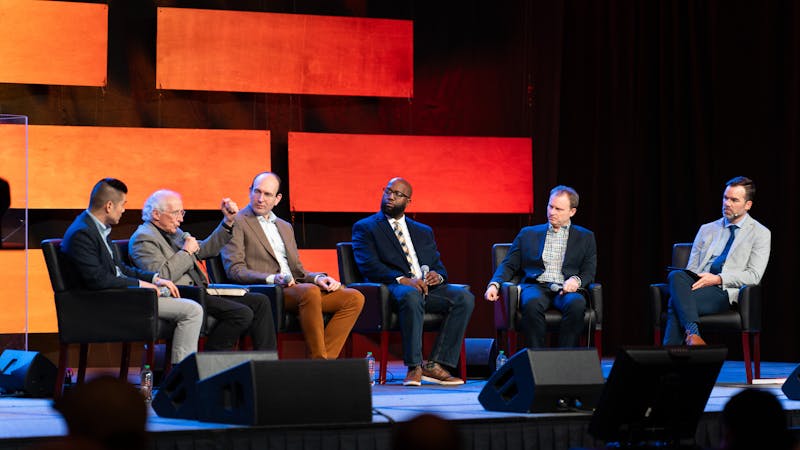Online Devotional
Desiring God
The Desiring God RSS Feed
Trusting God to Get God 1.5.2024 03:00
Why do you pray to God? Why do you trust God? In this episode of Light + Truth, John Piper reveals the ultimate aim of our prayers and trust.
Shepherding Criticism: Serious Joy Speakers Panel 1.5.2024 03:00

How can pastors serve so that praise doesn’t puff them up and criticism doesn’t crush them? By loving the reward of the Father more than the opinions of men.
Eager Compassion in Practice: Five Ways We Help the Poor 30.4.2024 03:00

The last of the apostles, Paul, noted in Galatians 2:9–10 how happy he was that the earlier apostles assigned him two tasks: missions and mercy ministry.
When [they] perceived the grace that was given to me, they gave the right hand of fellowship to Barnabas and me, that we should go to the Gentiles. . . . Only, they asked us to remember the poor, the very thing I was eager to do.
That’s a different reaction from what pastors often get when they ask congregants to remember the poor. A few are eager. Others ignore the call altogether. Many respond reluctantly, like all of us do at some point when growing up: Do I have to? I can understand the reluctance. Some people insist that they first have to remember their own families. They are struggling to make ends meet. Some are working two jobs. I sympathize with them.
I’m more critical of some others.
Less Compassionate Conservatism
For two years during the nineties, I went on more than a hundred flights per year to promote community-level projects to help the materially poor. As a “platinum medallion” Delta customer, I frequently had free upgrades to first class that left me sitting next to skilled and wealthy doctors, lawyers, and other professionals. I would ask what they thought about their tax bills. “Too high.” I would then ask, “What if you could lower your tax bill by committing ten percent of your work time to direct help for those living on the other side of the tracks?” Oh. They typically responded with words like these: “Hmm, paying up isn’t that bad after all.” Few were eager to remember the poor.
Remember, that was during the nineties, a blessed decade in American life. From 1991 (when the Soviet Union disintegrated) to September 11, 2001, we believed we had no enemies in the world that could trouble us. The economy was generally good. By the end of the decade, the federal government had a balanced budget. (We should repeat the words “balanced budget” three times while clicking our ruby slippers because now that seems like a fairy tale.)
If many people of means did not want to remember the poor then, how likely is enthusiasm now, when callous conservatism seems to have driven out compassionate conservatism?
That’s only one of our problems.
Do We Really Mean It?
A new book by David Bahnsen, Full-Time: Work and the Meaning of Life, notes that in the past two decades suicide and drug overdoses are both up thirty percent. One out of six American adults regularly takes antidepression medication, and (coincidentally?) one out of six prime working-age men (ages 25 to 54) is not in the workforce. And “volunteering is on the decline,” according to an NPR report just before Christmas.
Again, I’m not criticizing those who are working two jobs or are overwhelmed with family needs. Our lives have different seasons. Besides, all of us are spiritually poor. We all need help. But for anyone who has a couple of hours a week available to help the materially poor, including many widows and orphans, including women facing a crisis pregnancy and not knowing how they will survive, including others who are heavy laden — it’s worth remembering that Paul did not just talk about helping those poor: he was eager to help them.
In 1948, when Harry S. Truman was president, South Carolina senator Strom Thurmond vehemently attacked Truman’s call for ending racial discrimination by the federal government. A reporter noted that Thurmond had faithfully supported President Franklin Roosevelt, who had said pretty much what Truman was saying. The reporter asked Thurmond, “Why are you being so critical?” Thurmond replied, “Truman really means it.”
Today, in our middle-class and wealthy churches, we may talk about remembering the poor, but do we mean it?
Five Ways to Encourage Eagerness
Some people see preaching the gospel and helping the poor as competitors for time and treasure: choose one or the other. That’s not true. If we are truly grateful for the grace given us, we will eagerly tell others of that grace, not only in word but also in deed, not only with words but also with dollars, and not only with dollars but also with our time.
When gratitude for the gospel awakens eagerness, church leaders need to have practical programs for remembering and helping the poor. Here then are five practical steps that we can take to encourage eagerness.
1. Start really small.
First, when congregation members don’t know how to swim, start them in the shallow end of the pool. Do not proudly proclaim, “We will work with the long-term homeless.” No, many of those are the hardest to help, and the frustrations of trying will leave many people uneager to try again. Instead, start with children in grades one through four who are falling behind in reading. That puts them in danger of dropping out of high school and becoming ineligible for most jobs. Listening to little children read demands patience and the ability to say, “Good job.” They’re not threatening, and success there leaves helpers eager to move on to harder tasks.
2. Distinguish unable from unwilling.
Second, remember the poor by not treating them in a one-size-fits-all way. Two centuries ago, the mayor of Boston, Josiah Quincy, made a good tripartite distinction. Some among the poor are “able” (ready and willing to work, and thus needing a job, not alms). Some are “unable” (and thus worthy of alms). Some are able but “unwilling.” Church volunteers are likely to find pleasure in working with the able and the unable, and frustration with the unwilling. Quincy also recognized the need to know the poor individually and not make assumptions based on appearance. He gave the poor opportunities and let them show in which category they belonged.
3. Begin with talents, not needs.
Third, we can increase eagerness and avoid making premature distinctions by practicing ABCD, “asset-based community development,” an approach based on John McKnight’s teaching about starting with the talents of those seeking help rather than their needs, and building on what they can do rather than what they can’t do. Michael Mather, in Having Nothing, Possessing Everything, describes a church that put ABCD into practice: instead of passing out dollars, it helped a seamstress, a shoe repairer, a musician, and many others to monetize their skills.
4. Recover the goodness of work.
Fourth, Bahnsen’s Full-Time points out that American culture generally (including church culture) undervalues work. Many see work as a means to the end of not working. Many miss the way God created both physical and intellectual work before that tragic day in Eden: Adam was a gardener and a namer. After the fall, work is harder but still a means to discover our meaning and purpose, and to glorify God by cultivating the world he created. When some of the wealthy among us stop working as soon as they can, it’s hard to insist upon its importance for everyone. High schools and colleges earn their funding only when graduates wake up eager to work each weekday.
5. Learn from the experienced.
Fifth, we can learn not only from Bahnsen and Mather but from other books past and present. I learned a lot during the 1990s while writing on these issues. The deacons in my church read Steve Corbett and Brian Fikkert’s When Helping Hurts: How to Alleviate Poverty Without Hurting the Poor. Note the practical subtitles on three more twenty-first-century books: Robert Lupton’s Toxic Charity: How Churches and Charities Hurt Those They Help — And How to Reverse It, Lawrence Mead’s From Prophecy to Charity: How to Help the Poor, and Howard Husock’s The Poor Side of Town — and Why We Need It.
While writing a preface to the thirtieth-anniversary edition of The Tragedy of American Compassion, I read Gene Dattel’s good history book, Reckoning with Race — and saw that my reckoning was inadequate. Books by John McWhorter (including Losing the Race) and Thomas Sowell (including The Thomas Sowell Reader) can also help. Books from the right and left such as Jason Riley’s Please Stop Helping Us and Elizabeth Wilkerson’s Caste provoke thinking about the consequences of slavery, segregation, and hating our neighbors.
None of those five steps will work, of course, unless we desire God. The unjust, rich or poor, live by making demands. The just, poor or rich, live by faith.
Hagar, the Mother of Slavery: Galatians 4:21–31, Part 4 30.4.2024 03:00
Hagar represents the effort to be right with God by keeping the law. But human effort can never bring forth the children of God. Hagar only begets slaves.
Through Hell to Hope: Feeling Reality in Dante’s ‘Inferno’ 29.4.2024 03:00

“Abandon all hope, you who enter here.” This warning stands etched for eternity over the gates of Dante’s hell. It is one of the most famous lines in literature, and rightly so. It marks the beginning of Dante’s descent, following the footsteps of Christ, into the heart of the earth — a sobering journey that puts both the fear and fitness of divine justice on full display.
Many are tempted to “abandon all hope” at just the prospect of reading Dante. Perhaps you were forced to slog through Inferno in high school or read a few excerpts about Beatrice in college. Yet few realize that Dante wrote his epic poem, including his descent into hell, precisely to offer hope to Christians in their pilgrimage through this life. He offers himself as a guide for all who would follow in his footsteps, a shepherd of the Christian imagination.
C.S. Lewis once observed, “Certain things, if not seen as lovely or detestable, are not being correctly seen at all” (A Preface to Paradise Lost, 67). In other words, you don’t really see reality if you don’t feel rightly about it. If you don’t see God as beautiful, you don’t actually see God. If you don’t see sin as utterly ugly, you don’t actually see sin. Like trying to see a rainbow in black-and-white, you don’t really see it without the color. And here Dante shines as such a valuable guide for us because he leveraged all of his poetic prowess to help his readers see and feel rightly about God and everything else in relation to him.
In short, Dante wrote for you. By shaping our imaginations, Dante aims to pull back the veil of appearances and show us what’s really real. Therefore, if we will journey with him, Dante proves himself wonderfully relevant to Christians today. To motivate you to embark on this pilgrimage, I want to examine one image Dante gives us in Inferno that helps us envision just how detestable our sin is.
Showing the Invisible
Before turning to Inferno, however, a word on the imagination and how Dante appeals to it. Dante holds that a disciplined imagination is essential for Christian maturity because it serves an indispensable role in tracing the Good, the True, and the Beautiful to their fountainhead in the triune God. He celebrates the fact that all things find their meaning and purpose in relation to God, who is
The ever-living One and Two and Three
that ever reigns as Three and Two and One
uncircumscribed and circumscribing all. (Paradise, 14.28–30)
Furthermore, Dante sees the incarnation of Jesus as the key to understanding everything. Just as the Word became flesh and revealed the invisible God, man can imitate the incarnation through the imagination. Our words form images that make invisible realities visible. Good stories help us really see.
It should come as no surprise, then, that Dante has shaped and ordered the Christian imagination as much as any man besides Jesus. His labyrinthine fourteen-thousand-line poem, The Divine Comedy, is for the imagination a playground and a schoolhouse, a cathedral and an observatory, a courtroom and an art gallery. It is a story that springs up from the leaf mold of a mind saturated in Scripture and awed by “the love that moves the sun and other stars” (Paradise, 33.145). Thus, Dante can help guide us on the path of godliness and maturity.
Now, how does Dante employ the imagination to unmask the true nature of sin?
Sin Incarnate
In Inferno, Dante leads his readers into the depths of hell in order to illustrate what sin does to the soul. By presenting a host of sinners and their punishments, Dante paints soul-pictures to help us envision how sin leaves people bent and broken. In Dante’s vision, sinners embody the sins they cling to. To use the category we mentioned earlier, the sinner incarnates the sin. As Lewis puts it in The Great Divorce, the grumbler becomes a grumble. Fittingly, then, the punishments in hell are not tacked on after the fact. They are a picture of God giving sinners up to the intrinsic effects of their sin (Romans 1:24–32). Sin goes against the grain of God’s design, and Dante shows us what it looks like when you get splinters.
For instance, in canto 5 of Inferno, Dante presents those people who were dominated by lust in life as souls endlessly tossed to and fro by “a hellish cyclone that can never rest” (Inferno, 5.31). Like little birds in a blizzard, these souls are carried wherever the winds take them. This image perfectly depicts the sin of lust, which puts desire in the driver’s seat so that we are “led astray, slaves to various passions” (Titus 3:3). With this image, and a host of others, Dante helps us see the final destination of disordered loves.
The Soul-Picture of Ulysses
To look at a more involved example, Dante presents one of his most poignant and convicting soul-pictures in canto 26. In this eighth circle of hell, Dante meets the mythic character Ulysses, the mastermind of the Trojan horse and main character of Homer’s Odyssey. In Ulysses, Dante presents the embodiment of a sin that haunts the lips and keyboards of our own age — the misuse of words.
When Dante meets Ulysses, he recounts the story of his downfall. After a decade of fighting the Homeric wars, Ulysses finally returns home to his wife, son, and father. Yet he shamelessly admits that none of these bonds of love
Could drive from me the burning to go forth
to gain experience of the world, and learn
of every human vice, and human worth. (Inferno, 26.97–99)
Like the lustful, Ulysses is blown about by his passions. Like our first parents, he harbors a sinful obsession to obtain the knowledge of good and evil. Burning with this ambition, Ulysses uses his eloquence to inflame his war-weary friends with a desire to sail to the ends of the earth and storm the gates of Eden. However, before they can ever set foot on that hallowed shore, a whirlwind “to please Another’s will” sinks their ship, killing the whole crew. God quelled Job’s curiosity from the whirlwind, and Dante envisions the same for Ulysses’s folly.
In this image of Ulysses, Dante shows the destructive power of the tongue. Ulysses is a master rhetorician, and his words are poison. With just nine lines of speech, Ulysses convinces those he calls brothers to join him in his sin. He boasts,
I made my comrades’ appetites so keen
to take the journey, by this little speech,
I hardly could have held them after that. (26.121–123)
With carefully wrought words, Ulysses enflames the desire of others, enticing them into sin that ends in death (James 1:14–15).
The Fiery Tongue
The story itself is a parable of warning, but it is the punishment that finally unmasks the sin. Ulysses’s penalty involves being eternally encased in a tongue of flame, a flame kindled by the blaze of his own tongue. Here Ulysses embodies the sin of misusing words. And the punishment fits the crime for at least three reasons.
First, it is a kind of anti-Pentecost. At Pentecost, the Spirit rested on men like tongues of fire, freeing the tongues of men to set the world ablaze with truth. Yet Ulysses is imprisoned by his tongue, locked in his own lies. Second, as James tells us, the tongue is a fire, a restless inferno of unrighteousness (James 3:1–12). The fiery tongue kindles the world. Third, in life, Ulysses’s tongue devoured the lives of his friends. Now the very flame that consumed others eternally consumes the soul that wielded it. He entrapped with words, and now he is entrapped. The arsonist burns on his own pyre.
This image rightly haunts the imagination. It is truly terrible because the sin it reveals is detestable to God! Even as I write these words, I behold Ulysses as a blazing beacon of warning. My tongue, just like yours, is powerful. I can use it to help others enjoy God and see Christ. Or I can twist it to my own ends, subtly kindling my own ego and reputation. I can use it to bring life or, like Ulysses, to bring death.
Dante himself felt this danger. Staring at Ulysses veiled in flame, Dante determined to “hold my genius under tighter rein / Lest without virtue’s guidance it run loose” (Inferno, 26.21–22). Dante, gifted with great linguistic ability, knew he could lead others to ruin if God did not tame his tongue.
And the warning of Ulysses is not limited to professional wordsmiths. With the help of the Internet and social media, the reach and speed of our words today make the danger all the greater. Ulysses’s “little speech” is no longer than an average text message or social media post, and they can be just as deadly. Like sparks in a forest, a few lines of misused words can set society ablaze. Therefore, we would do well to heed Dante’s image of Ulysses.
Imagining Reality
More broadly, we would do well to heed all of Dante’s images. I have given just one snapshot of how Dante — a man saturated in Scripture and enchanted by myth — can guide us on the Christian pilgrimage by shaping our imaginations. He can help us love much when we realize we have been forgiven much (Luke 7:47). He can guide us up toward holiness by revealing the ugliness of sin. He can help us bask in the light of God.
In short, Dante — and others like him who wield the imagination faithfully — can pull back the veil and show us a glimpse of the way the world really is.
God and His Gospel 29.4.2024 03:00

What is God’s great goal in the gospel? In this episode of Light + Truth, John Piper explores Scripture’s repeated answer to that often-neglected question.
Are Parents to Blame for Prodigals? 29.4.2024 03:00

Does Proverbs 22:6 promise that children raised by godly parents will become Christians? Pastor John explains the proverb and points parents to their ultimate hope.
Born by Flesh, Born by Promise: Galatians 4:21–31, Part 3 28.4.2024 03:00
The children of God are not the product of human effort. Like Isaac, they are brought forth by divine promise based on divine prerogative.
Better Than Our Bitter Thoughts: The God of Surprising Goodness 27.4.2024 03:00

What is the difference between those welcomed into heaven and those thrown into hell? Can we imagine a more relevant or urgent question? While depicting the final judgment in parable form, Jesus gives us a surprising answer: their thoughts.
“What comes into our minds when we think about God is the most important thing about us,” wrote A.W. Tozer (Knowledge of the Holy, 1). Jesus shows this true for the evil servant in the parable of the talents (Matthew 25:14–30). In the parable, Jesus gives us a glimpse into one difference between those welcomed into heaven and those thrown into judgment: their beliefs about God’s goodness. We get beneath actions into the psychology of the lost man, a window showing what squirmed beneath his disobedient life.
As we consider him, be asking yourself questions such as: What comes to mind when I think about God? Who do I assume he is? What does he love? What does he hate? What kind of Person governs the world? Is he good? Is he happy, blessed, disposed to give freely, or not? Beliefs about his goodness can lead to a useful life with heaven to follow or a worthless life with hell close behind.
At Journey’s End
The master finally returns from his long journey to meet with his three servants “and [settle] accounts with them” (Matthew 25:19). Before he left, he had entrusted them with his property, each according to his ability. He gave the ablest man five talents; the next, two talents; and to the last, he gave one. Jesus focuses the parable on their report of their stewardship in his absence. Had they been watchful for his return and about their master’s business (verse 13)?
The first two report, rejoicing with their lord that, by their trading, they had each doubled what their master left them. Eyes then turn to the third servant. “He also who had received the one talent came forward” (verse 24).
Had he set off to the happy work like the first two servants? No. He buried the treasure in the backyard. But why? For the same reason as many today: he did not know the goodness of his master.
The God He Thought He Knew
Note the first words out of the servant’s mouth: “Master, I knew you to be a hard man.” What a different assessment from the first two, and what a strange conclusion given the facts we know. Do many masters entrust such valuable property to their servants’ keeping? Pharaoh withholds straw to make bricks, but this master hands over precious jewels from the vault. A talent is not a single coin; it is a treasure chest of precious wealth, twenty years of wages. The master hands him up to one million dollars in today’s wages — and simply leaves. Who is the servant to steward such wealth?
To account for this unbelievable opportunity, the servant twists the interpretation to excuse his thanklessness. “Master, I knew you to be a hard man, reaping where you did not sow, and gathering where you scattered no seed” (Matthew 25:24). He thought he knew an exacting master, a groping master, a severe man about the bottom line.
His lord — seemingly generous beyond any master earth has ever seen — was really grasping, not giving; extracting, not investing; extorting, not enriching. We even hear an accusation of laziness against the master — he was one who didn’t get his own hands dirty. Don’t we sometimes project our own sins upon God, as this “slothful” servant did (verse 26)?
So, he saw his master as a giant fly, rubbing his greedy hands in anticipation of profit. Faceless were the slaves who built his house. Should this servant stoop to be ridden as a donkey? Was he an ox to tread grain? This master’s yoke was not easy, nor his burden light.
Finally, his wickedness curls up in the fetal position. “I was afraid, and I went and hid your talent in the ground” (verse 25). Thus, he knew a God to be feared, but not obeyed. This man knew his master’s will and thought to lazily hide from the failure of trying in the failure of disobedience. He committed his talent to nature’s vault. Better for his master to lose benefit than go bankrupt. “Here, you have what is yours” (verse 25).
The God He Did Not Know
That was the God he thought he knew: a hard and severe master whose generosity was pretense for profit, a master who fed his cattle well. He did not know the master that animated the service of the other two servants.
1. He did not know the master eager to commend.
The passage stresses that the two faithful servants left “at once” to do their master’s work (verses 16–17). I imagine them going forward with excitement. Really, me? I get to serve my Lord in this way? And that same excitement brought them to show their master the fruit of faith-filled trading, as children with a Father: “Here are your five talents, master, and five more!”
And how does the master respond? With that fatherly twinkle of satisfaction in his eyes, he will not let them do one thing more without warming them with his pleasure: “Well done, my good and faithful servants!” (verses 21, 23).
2. He did not know the God who gives for keeps.
In the end, how false and foolish this servant’s meditations of the miserly God. Wonder with me: the master didn’t give the talents for his own profit, but for theirs. He gave for keeps. This Lord designed for loyal stewards to keep their talents and the increase.
The worthless servant learned this lesson the hard way: “Take the talent from him and give it to him who has the ten talents” (Matthew 25:28). He doesn’t say, “Give to the servant who made me five talents.” The talents now belong to the servant, as confirmed in the next line: “For to everyone who has will more be given, and he will have an abundance” (verse 29). From before the journey, this master gave intending to make them rich. His joy — “Well done, good and faithful servant!” — was not in what he gained, but in what they gained. Is this your hard and stingy God?
3. He did not know the master who gives in order to give more.
“You have been faithful over a little,” he tells the good servants. “I will set you over much” (Matthew 25:21, 23). Do not let that humble word little pass by unnoticed. The five-talent servant gained another lifetime of value by his trading. Jesus calls this stewardship little compared to the much on its way.
Have you placed your life and all that you own upon the altar before God? Have you left family or fortune for the gospel? Have you despised your life in this world, looking to that country to come? Little your trading, great your promotion. Remain constant, as Joseph governing in prison: soon, you shall stand second-in-command in the new heavens and new earth; he will set you over much. Our greatest labor for Christ in this world is but the small beginnings to our real labor for Christ in the next.
4. He did not know the God of spacious joy.
What did the wicked servant think as he overheard the master’s final remark to the truehearted? “Enter into the joy of your Master” (verses 21, 23). The evil servant did not know that this Master’s joy was a country of happiness. He thought him a hard man, an unhappy man, but he is the happiest of all men. “Leave your joys behind and enter mine!” Or, “These things I have spoken to you, that my joy may be in you, and that your joy may be full” (John 15:11). Here is a God to labor under. Here is a God to trust. Here is a God who can happify his servants forever.
He Hides a Smiling Face
If he only believed in the blessedness of this master’s heart, that the master really meant to reward and welcome him into his own joy upon his return, how things might have changed. The problem was not his master; the problem was his heart. The problem was not his abilities; the problem was his sloth. The master’s assessment proved him an evil, lazy, unreasonable servant (Matthew 25:26–27). In the end, he is cast into outer darkness. Sinners who spin lies get caught in webs.
So, my reader, what do you think of God? Does he give us serpents when we ask for bread? Is he watching with an eagle’s eye to strike you when you stumble? Is he stingy, heartless, selfish? Does he tax at high rates and offer mere rations to strengthen for tomorrow’s slavery? How does your life answer?
If we think high of him, he is higher. If we think well of him, he is better. If we think base of him, he shall not always correct us. Unjust beliefs that lead to unjust lives provoke his justice. “With the merciful you show yourself merciful; with the blameless man you show yourself blameless; with the purified you show yourself pure; and with the crooked you make yourself seem tortuous” (Psalm 18:25–26).
Some of you do not serve him because you do not know him. Others have let hard and bitter circumstances deceive you into thinking he is hard and embittering. Business is not going as planned. You just received news that you lost the baby, again. Life should have been so different by now.
And the perfectly aimed question comes: Is this your good Master? O saints, Satan is asking God about some of you just now — “Does this ‘faithful servant’ really keep his integrity? Does he fear God for no reason? Touch his health, touch her fertility, touch his money, and they will curse you to your face.”
O saints, the Master is so good — above our deserts or imaginings — and he proved it for all time. How? By handing us his property, taking the long, faraway journey to Golgotha, and dying on the cross to pay our debts that we might keep his blessings. The Master not only gives his property to us — he offers himself for us. On the cross, Jesus lifted God’s goodness high above any of our earthly circumstances. “God shows his love for us in that while we were still sinners, Christ died for us” (Romans 5:8).
So,
Ye fearful saints, fresh courage take;
The clouds ye so much dread
Are big with mercy and shall break
In blessings on your head.Judge not the Lord by feeble sense,
But trust him for his grace;
Behind a frowning providence
He hides a smiling face. (William Cowper, “God Moves in a Mysterious Way”)
God’s Shocking Love 26.4.2024 03:00

What about God’s love for us is so shocking? In this episode of Light + Truth, John Piper looks to the book of Hosea for Scripture’s provocative answer.
WORSHIP TIMES:
Sunday: 9:30 am
Live Stream at 9:30 am
Office Hours:
Monday- Friday
8:00 am - 4:00 pm
If you need anything after these times, please call 928-342-6002, and leave a message and we will return your call. Thank you